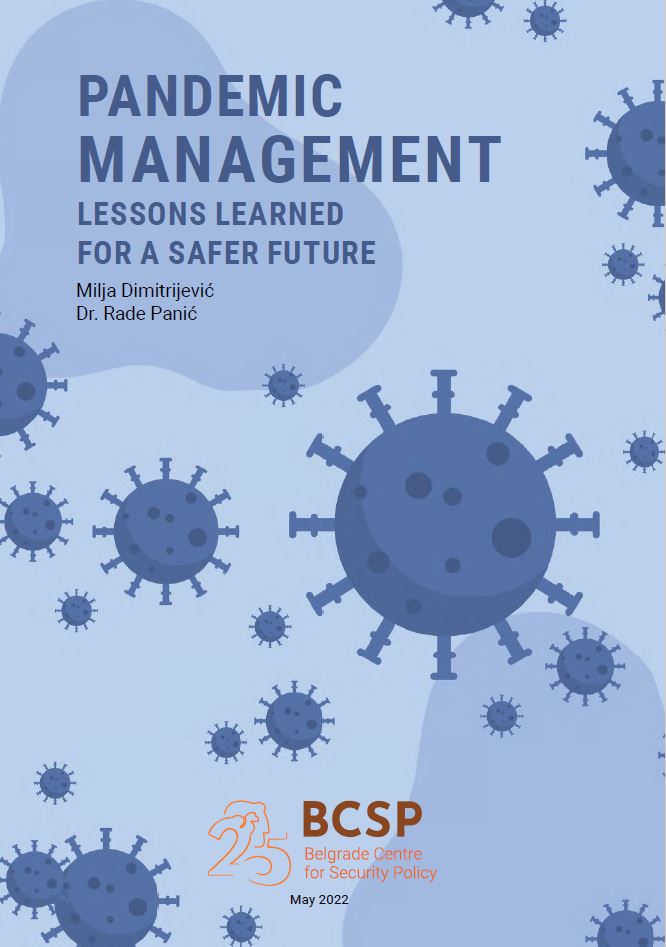PANDEMIC MANAGEMENT: LESSONS LEARNED FOR A SAFER FUTURE
PANDEMIC MANAGEMENT: LESSONS LEARNED FOR A SAFER FUTURE
Author(s): Milja Dimitrijević, Rade Panić
Subject(s): Social Sciences, Sociology, Health and medicine and law
Published by: BCBP Beogradski centar za bezbednosnu politiku
Summary/Abstract: The COVID-19 pandemic (coronavirus disease), which was declared by the World Health Organisation on 11 March 2020, is one of the biggest challenges the world has faced since the end of World War II, as evaluated by major decision-makers in the world in the vast majority of countries worldwide. The pandemic is certainly primarily a problem and an issue in the field of public health. However, given the consequences it causes, the pandemic is a political and security issue, both nationally, regionally, and globally. There is almost no area of social life that has not been affected by the pandemic. During the first two years of its existence, the political, economic, and cultural dynamics changed completely. As a highly infectious disease that disrupts normal social functioning, the COVID-19 epidemic, like any epidemic, opens the door for politicians and national authorities to adopt measures aimed at preventing the spread of the disease. Although the pandemic in some way completely surprised social and political actors, its outbreak did not come as a surprise to experts who were announcing the possibility of an outbreak of a health crisis of this magnitude. Also in 2022, when the pandemic is no longer a topic of the utmost importance, as well as when the situation has calmed down, experts are warning that there is no room for great relaxation. Namely, not only that the COVID-19 pandemic is over yet, but there are warnings of an outbreak of a pandemic of new infectious diseases. That is why the team that worked on this analysis considered it necessary to reflect on all the good and bad things done in the management of the pandemic in Serbia, in order to be better prepared for the next one. The political and social context in which the pandemic management in Serbia is analysed is marked by a drastic decline in the level of democracy in the country, as well as the strengthening of authoritarian tendencies in the state and society within the process of “capturing the state” by the ruling elite. Unfortunately, Serbia cannot boast of successful results, especially if we take into account the number of deceased citizens, as well as the low level of vaccination compared to European Union countries. The number of deceased citizens in 2021 is as much as 18 percent higher than in the same period in 2020.1 Statistical data show that in 2021, most people died in Serbia within one year since the end of World War II.2 These data speak volumes about the results of the crisis management caused by the COVID-19 epidemic in Serbia. Hundreds of pages of an analysis can be written about the pandemic management in Serbia, because the subject matter of research is voluminous in its scope. Therefore, in this analysis, and due to limited space, the focus is on two aspects of pandemic management – the legal aspects of crisis management and the health system’s readiness to deal with the crisis. The analysis was created within the framework of informal cooperation between the Belgrade Centre for Security Policy and the Union of Doctors and Pharmacists of Serbia. The author of the paper on the legal aspects of pandemic management is a lawyer from the Union of Doctors and Pharmacists Milja Dimitrijević, while the part about the capacities of the health system was written by Dr. Rade Panić, the President of the Union of Doctors and Pharmacists. The analysis was created within the survey that was conducted from October 2021 to March 2022. Precisely because of that, some data in the analysis were presented during the writing of the analysis itself, which were relevant during the research and writing the analysis (for example, when writing about the number of infected citizens, or the number of deceased doctors). Finally, the analysis concludes with certain recommendations necessary to improve the management of the COVID-19 pandemic, but possibly some other pandemics in the future.
Series: Beogradski Centar za Bezbednosnu Politiku - POLICY PAPERS
- Page Count: 37
- Publication Year: 2022
- Language: English
- Content File-PDF

